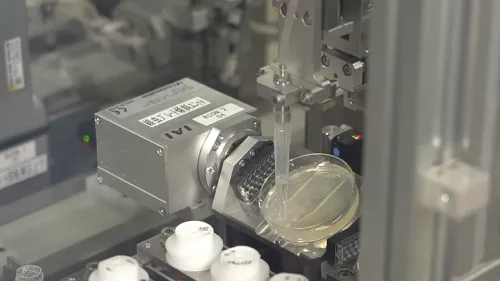Source: www.euronews.com
Author: Aylin Elci

N-Nose uses nematode worms and urine to screen cancer in patients. – Copyright Courtesy Hirotsu Bio Science
Scientists say the humble roundworm can sniff out cancer cells and could help save lives by spotting tumours at a very early stage.
Japanese start-up Hirotsu Bio Science is shaking up early cancer screening with the help of an unlikely ally: tiny worms.
Instead of relatively invasive and expensive methods such as endoscopies, surgeries or blood tests, the company only needs a urine sample to detect early-stage cancer (0 to 1) in patients.
“We usually go to hospital when we start feeling something strange in our body,” Eric di Luccio, Chief Technology Officer at Hirotsu Bio Science, told Euronews Next.
“That’s when the cancer is detected, but it’s usually at an advanced stage and the odds of getting out of it alive will depend on the cancer, but sometimes it’s bad,” he added, calling primary cancer screening in urine samples a “game changer”.
While cancer is “detected” in patients who have symptoms, screening, on the other hand, is conducted on healthy patients. According to a recent report by the American Cancer Society, both of these actions are among the reasons why deaths linked to the disease are decreasing.
Nobel Prize worms and smelly cancers
Hirotsu Bio Science’s flagship product, N-Nose, is a non-invasive invasive cancer screening process that uses tiny worms’ olfactory sense to find cancer in urine samples.
The Caenorhabditis elegans or C. elegans is a millimetre-long benign worm, commonly referred to as a nematode or roundworm, and found in places that balance humidity and heat, such as soil environments.
Nematodes are also model organisms or non-human species regularly used in research to help understand broader biological phenomena. Research on these worms started in the 1960s and has already snatched three Nobel Prizes (Physiology or Medicine in 2002 and 2006, and Chemistry in 2008).
After spending years researching the olfactory sense of nematodes, Dr Takaaki Hirotsu combined research that had never been connected before.
The first one was on nematodes, and the second was on the smell of cancer in bodily fluids such as urine. That’s how, in 2015, he discovered that nematodes were able to smell cancer.
“We can’t necessarily smell cancer ourselves, and dogs can be trained to detect cancer, but it turns out that nematodes really react to the sense of smell,” di Luccio said of the tiny worms, which rely on their sense of smell to navigate, find food and avoid danger.
How it works
To conduct the test, lab workers put the urine in a Petri dish along with the worms. Nematodes make their way towards the urine if there is “presence of cancer” and stay away from it if there is none.
The N-Nodes test, which isn’t yet available in Europe, currently detects 15 different cancers including bile duct, bladder, breast, colorectal, gall bladder, kidney, liver, lung, pancreatic, prostate, oesophageal, oral, ovarian, stomach and uterine cancers.
For about €95, customers in Japan can purchase a test kit online and either have their sample picked up from their home, or they can drop it off at a pharmacy partnering with the start-up. The sample is then put through an automated system, where the test is repeated 20 times to minimise errors.
Four weeks later, customers receive by mail results ranging from A to E, the latter indicating a high risk of cancer.
While N-Node tests are more sensitive than other methods of screening for stage 0 cancers (94.7 per cent of accuracy), across cancers the results are 86.3 per cent accurate.
On its website, the start-up warns that a positive test result “does not confirm the absence of cancer, and test results of ’high cancer risk’ does not necessarily indicate the presence of cancer”.
“When customers receive their results, we provide a flowchart on how to proceed depending on the risk scale, but the customer can always call us and get some guidance,” said Di Luccio.
Customers who test positive are advised to get in touch with their doctor for further tests at a hospital after N-Nose’s primary screening method.
Saving Steve Jobs
“Nematodes can detect the smell of 15 kinds of cancers, but we are also working on finding patterns between cancers,” Dr Masayo Morishita, scientist at Hirotsu Bio Science, told Euronews Next.
The company is currently focusing on identifying volatile organic compounds (VOCs), chemicals produced by our bodies, to differentiate the type of cancer a patient is suffering from based on their urine sample.
This year, the start-up commercialised its first cancer type specific test. N-Node can now tell a customer whether it is suffering from pancreatic cancer, a highly lethal type that doesn’t usually have a screening method.
“Steve Jobs died of pancreatic cancer, and early detection of this type is really difficult. When it’s detected, it’s usually too late, and the mortality is high,” said Di Luccio.
Over 350,000 people have already taken the tests in Japan, which ranked 20th in cancer incidence around the globe in 2020.
It’s estimated that half of Europeans will develop cancer at some point in their life, according to EU data.
The lab is currently looking for partners to launch the product around the globe, including in Europe.

Leave A Comment
You must be logged in to post a comment.